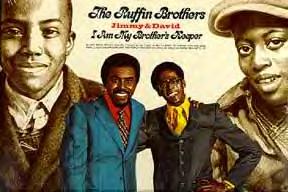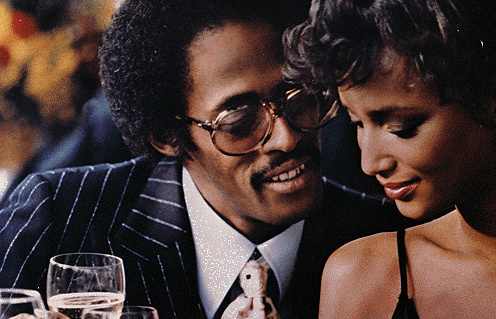
During stage performances when he spun out of a chorus and dropped to his knees, your heart stopped on the downbeat. After The Temptations voted to "dismiss" him from the group in 1968, David refused to accept his departure and would show up at performances, leap up on the stage and steal the show. pictured below
David's departure from The Temptations was the story of 1968, but the wonderful reaction to "My Whole World Ended (The Moment You Left Me)" from his debut LP My Whole World Ended and "I've Lost Everything I've Ever Loved, from the same LP, soon quieted both David and his fans. Also on his debut LP was a incredible bluesy number "The Double Cross" (my personal favorite). The debut LP was followed by Feelin Good and despite some great numbers like "I'm So Glad I Fell For You", it didn't fare very well.
Following the poor response from this second LP, as well as the third self titled David Ruffin LP, David ventured into a joint project with older brother Jimmy Ruffin titled I Am My Brothers Keeper, again without much success. David Ruffin was a tremendous talent, but for whatever reason his solo never matched the success he had with The Temptations.
It was David's conjecture that Motown, while concentrating on more high profile performers, was not promoting his material. In the end of 1975 Ruffin's genius would again be found in his anguished performance of "Walk away From Love", from his fifth LP Who I Am, which also contained the excruciatingly personal and self-penned "Statue Of A Fool". The album that followed, Me 'N Rock "N Roll Are Here To Stay, didn't do well at all. On the next album, the song "Everything's Coming Up Love", from the album of the same name reached #8 on the R&B charts. Next was In My Stride, with the anguished "Just Let Me Hold You For A Night", a great song although it only reached #18 on the R&B charts. David left Motown for Warner at this point, for So Soon We Change, and Gentleman Ruffin, neither of which did much of anything. Although Ruffin's power certainly had never waned, and there were some great songs on veteran Detroit disc jockey and close friend of David's, labeled Ruffin as misguided, with personal problems that held him back from the success his talent deserved. He recalls Ruffin as being "near tears", talking about how he had learned his lesson and how he was going to get his life back together. "It lasted about a week", he said, "then David was back to being David."
In the end of 1975 Ruffin's genius would again be found in his anguished performance of "Walk away From Love", from his fifth LP Who I Am, which also contained the excruciatingly personal and self-penned "Statue Of A Fool". The album that followed, Me 'N Rock "N Roll Are Here To Stay, didn't do well at all. On the next album, the song "Everything's Coming Up Love", from the album of the same name reached #8 on the R&B charts. Next was In My Stride, with the anguished "Just Let Me Hold You For A Night", a great song although it only reached #18 on the R&B charts. David left Motown for Warner at this point, for So Soon We Change, and Gentleman Ruffin, neither of which did much of anything. Although Ruffin's power certainly had never waned, and there were some great songs on veteran Detroit disc jockey and close friend of David's, labeled Ruffin as misguided, with personal problems that held him back from the success his talent deserved. He recalls Ruffin as being "near tears", talking about how he had learned his lesson and how he was going to get his life back together. "It lasted about a week", he said, "then David was back to being David."
Following the Reunion tour with The Temptations, David seemingly dropped out of sight for a few years. "Sometimes an artist is lost and needs to find a new direction for himself or his music," Ruffin said, explaining his three year absence. In April of 1983, he was released from the low-security farm in Terre Haute, Indiana, where he had served a 4 1/2 month jail sentence for failing to pay income taxes for most of the 1970's. On New Years Eve of 1985, while Eddie Kendrick was performing at The Premier Center in Detroit, David came down from his horse ranch in Pinckney to watch his friend perform. Eddie called David on stage to perform, which he did, and less than a year later, the two would get together for a tour. They would do a live album and appearance at The Apollo Theater with long-time friends Hall & Oates, as well as several projects like Live-Aid and Sun City artists against apartheid.
They would do a live album and appearance at The Apollo Theater with long-time friends Hall & Oates, as well as several projects like Live-Aid and Sun City artists against apartheid.
In 1987, Ruffin and Kendrick would do an album for RCA. In 1989, following The Temptations induction into the R&R Hall of Fame ceremony, David and Eddie would get together with Dennis Edwards and the trio would tour together.
 David seemed to be back on track, but would continue to get into trouble with the law, and would be in and out of drug treatment programs. He would sometimes party into the night, the next day, and sometimes the day after that. The fame had wilted and the money was gone. It seemed that David was his own worst enemy, and there was continual self denial that he had a problem. Unfortunately, on June 1, 1991, the downward spiral into drugs and depression would end his life, and the world lost one of the greatest soul singers of our time.
David seemed to be back on track, but would continue to get into trouble with the law, and would be in and out of drug treatment programs. He would sometimes party into the night, the next day, and sometimes the day after that. The fame had wilted and the money was gone. It seemed that David was his own worst enemy, and there was continual self denial that he had a problem. Unfortunately, on June 1, 1991, the downward spiral into drugs and depression would end his life, and the world lost one of the greatest soul singers of our time.

In Loving Memory of David Ruffin